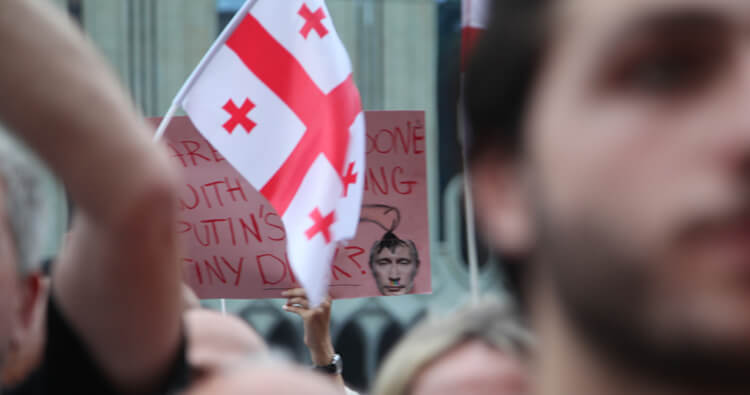Russian state reaction to Tbilisi protests: calls for boycott of tourism, goods

Protesters carry a banner with the face of Russian president Vladimir Putin during demonstrations in Tbilisi on Thursday. Photo: Nino Alavidze/agenda.ge.
Russian officials on Friday called for boycott of tourism and trade relations with Georgia following what President Putin's administration called a "Russophobic provocation" in Tbilisi clashes the previous day.
The Kremlin released the official reaction of Russian state's Security Council following its meeting chaired by Putin on Friday, denouncing as a "dangerous display" the protests following an appearance of the Russian State Duma MP Sergey Gavrilov at the Georgian parliament on Thirsday.
We consider the Russophobic provocation, provoked by extremist elements towards Russian parliament members, as a very dangerous display."
The Ministry of Foreign Affairs [of Russia] has been given the recommendation of issuing a warning to Russian citizens, including tourists, travelling to or residing in Georgia, regarding possible dangers in relation to actions of the extremists," an official release from the administration of the Russian president read.
MPs told reporters what happened in Georgia.
— State Duma (@state_duma) June 21, 2019
Sergei Gavrilov: Georgian radicals tried to hinder the development of relations between #Russia and #Georgiahttps://t.co/sGlVuP4yXm
Prime Minister Dmitry Medvedev also offered his reaction to the events, responding to President of Georgia Salome Zurabishvili. The latter had spoken about Russia's occupation of two of Georgian regions - which is not recognised as such by the Russian government - when commenting on Thursday's events in Tbilisi.
Russia's Ria Novosti news agency reported Medvedev as calling Zurabishvili's description "extremely unprofessional" and adding it was "unfortunate to hear such rhetoric" from the Georgian president.
Members of the legislative body of the Russian Federation, the State Duma, were also involved in reactions to the developments in Tbilisi.
Mikhail Degtyarev, Head of the Committee on Physical Culture, Sport, Tourism and Youth Affairs of the lawmaking body, called for a "boycott of all resorts and trade goods of Georgia" after what he called "Russophobic demonstrations" in Georgia in an update to his social media followers.
[The boycott] would be the most correct decision after another wave of Russophobic demonstrations in Tbilisi."
Let [Georgia] expect tourists from the USA and the EU and sell [mineral water] Borjomi to the European market," Degtyarev said in his comments on Telegram social network.
Duma MP Gavrilov, whose taking of the seat of the Georgian Parliament's Speaker on Thursday sparked the protests and subsequent clashes, told reporters in Moscow Russia should take part in Georgian investigations of the incidents in Tbilisi.
????#Opinion by Maria #Zakharova: Yesterday’s violent attacks caused the most damage to #Georgia itself. The radicals showed their level of friendliness and peaceful potential to the Abkhazians and South Ossetians. ????https://t.co/6JH5ecru2J #Russia #Abkhazia #SouthOssetia #Tbilisi pic.twitter.com/7koHPrAvtI
— MFA Russia ???????? (@mfa_russia) June 21, 2019
Gavrilov, who is Head of the Duma Committee on Issues of Public Associations and Religious Organisations, said his country would "not interfere in internal affairs of Georgia and attempts at destabilising the government", but should be part of inquiry into "aggressive and hostile actions towards the [Russian Federation]".
The Duma member also added he thought investigations should not affect an "increase in good neighbourly relations and respect" between the Russian and Georgian nations and their Orthodox churches.
Gavrilov was heading the Russian delegation to an Interparliamentary Assembly on Orthodoxy in Tbilisi when he sparked a protest of opposition MPs in the Georgian lawmaking body when he took the seat of the institution's chair to deliver his address.
Opposition MPs in the parliament protested the address based on Gavrilov's alleged participation against Georgia in the 1992-1993 War in Abkhazia and Russian military's ongoing occupation of Georgia's Abkhazia and Tskhinvali (South Ossetia) regions.
This sparked protests by the political figures and citizens outside the parliament building and preceded their recurring physical clashes with police on Rustaveli Avenue throughout the night of June 20-21.
 Tweet
Tweet  Share
Share